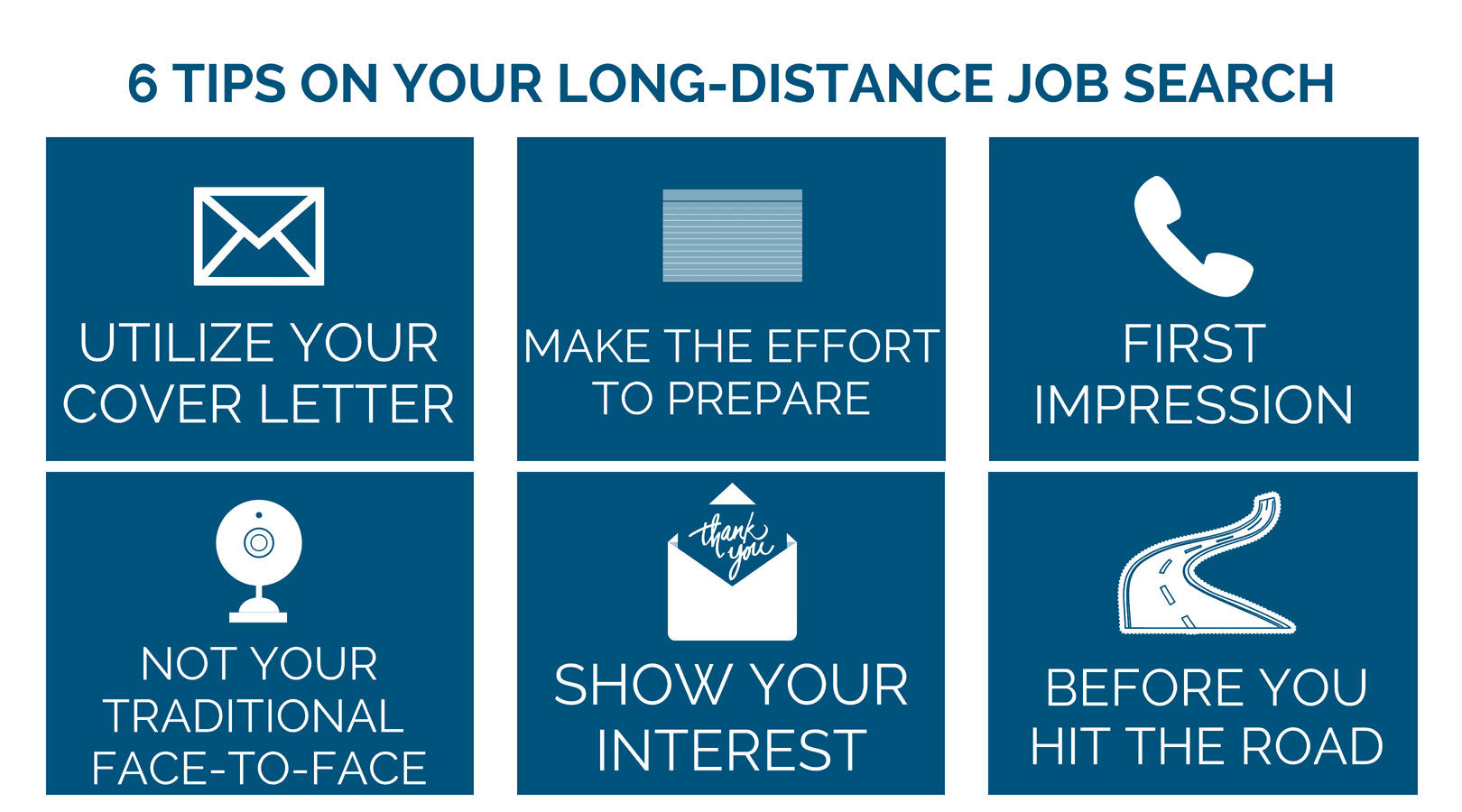 People are finding it more difficult to stay in one place for too long. Whether you are moving back home to be close to family, relocating with a partner, or a recent graduate ready for your next adventure. Whatever the reason may be, a long-distance job search shouldn’t be treated the same as a local search. There are important changes that job seekers need to make in order to find success in their job search. Below are six must-dos you should consider during your long-distance job hunt:
People are finding it more difficult to stay in one place for too long. Whether you are moving back home to be close to family, relocating with a partner, or a recent graduate ready for your next adventure. Whatever the reason may be, a long-distance job search shouldn’t be treated the same as a local search. There are important changes that job seekers need to make in order to find success in their job search. Below are six must-dos you should consider during your long-distance job hunt:
1. Utilize your Cover Letter
The best cover letters are ones that are customized to the specific position you’re applying for. Include traits and qualifications you possess that the position requires. Keep in mind, when the job is hundreds or thousands of miles away, you’ll need to complete an ‘extra’ step. You must include the reason why you’re moving to that specific area. It’s an extra effort for hiring managers to consider a long-distance candidate so, make sure you provide enough context and good reasoning for them to seriously consider you.
It’s also important to include specific dates when you’ll be in the area. This gives the hiring manager the option to meet you sooner rather than later. A long-distance job search typically involves a phone and Skype interview so, meeting in person would give you an opportunity you otherwise may not have.
2. Make the Effort to Prepare
If you get a phone interview then technically you’re allowed a ‘cheat-sheet’. Once you complete your research on the organization and position, jot down some helpful notes or key ideas to keep nearby during your phone interview, alongside with your resume. This is a great tool to use as a reference when you’re being asked specific questions about the position and your past experience.
Also don’t forget to convert your time to the interviewer’s time zone, if applicable. This means getting settled and expecting your phone call a few hours earlier or a few hours later, depending on the time zone of your desired city.
3. First Impression
Invest time in setting up a comfortable space to complete your phone interview. The best location to take the phone call is in an environment that you can control. This typically is in your home so you can warn family members in advance to not disturb you for the hour. Take it a step further by turning off any reminders or alarms set on your phone or laptop that could interrupt the conversation.
As nerve racking as a phone interview can be, it’s important to maintain good posture and smile throughout the whole conversation. Studies show that you can hear when someone is laying down and groggy over the phone, similarly if you smile while you speak you’ll sound more upbeat and confident.
4. Not your Traditional Face-to-Face
The first impression has been made and the next step allows you to physically see your potential employer. It’s just as important to set up your space for a Skype interview as you would in a physical office. To ensure an uninterrupted conversation, find a quiet spot with strong reliable Wi-Fi.
One of the most beneficial things one can do before a skype interview is to practice. Test your Wi-Fi connection by asking a friend to call you and practice eye contact with them. As awkward as it may feel, make sure you look into the webcam rather than at the screen during the chat. Keeping eye contact with the webcam is equivalent to face-to-face eye contact, so make sure to practice!
5. Show your Interest
Once you’ve completed your interview follow up promptly, as you would after an in-person interview. Sending a quick email within a few hours will go a long way. Not only does it show your excitement about the position, but also your appreciation for the opportunity to speak with the interviewer.
6. Before you Hit the Road
Many companies will negotiate relocation expenses with you. Since they are not always promised, it’s important to have a realistic plan prepared throughout this process. A company won’t wait seven months for you to make arrangements. Having the necessary steps planned out prior is key. Evaluate how much time, effort, and money you’re willing to spend to make this exciting transition in your career.
 Before accommodations can be made, you must follow these six concrete steps to secure your long-distance job. Applying from afar does require additional steps but, you’ll succeed if you execute each step in order to land your new job and move onto your next adventure!
Before accommodations can be made, you must follow these six concrete steps to secure your long-distance job. Applying from afar does require additional steps but, you’ll succeed if you execute each step in order to land your new job and move onto your next adventure!
Comment below if you’ve applied for a long-distance job. We want to know the steps you took during your job search and where your new job took you!
Looking for more ways to improve your job search? Subscribe to the JOHNLEONARD blog today and receive helpful advice directly from our team!
